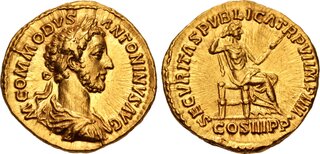| Classical Numismatic Group > Triton XXVII | Auction date: 9 January 2024 |
| Lot number: 789 Price realized: 13,000 USD (Approx. 11,907 EUR) Note: Prices do not include buyer's fees. | Show similar lots on CoinArchives Find similar lots in upcoming auctions on |
| Lot description: Commodus. AD 177-192. AV Aureus (19.5mm, 7.09 g, 6h). Rome mint. Struck AD 181. M • COMMODVS ΛNTONINVS ΛVG, laureate, draped, and cuirassed bust right / SECVRITΛS PVBLICΛ TR P VI IMP IIII, COS III P P in exergue, Securitas, draped, seated right, resting head on right hand and holding transverse scepter in left. RIC III 23 var. (not cuirassed); MIR 18, 514-2/37; Calicó 2325 (same rev. die as illustration); BMCRE 54 var. (same; same rev. die); Biaggi 1011 var. (bust type); Mazzini 700 v. (same obv. die). Some luster, light scratch. EF. The sole reign of Commodus, AD 180-192, is often viewed as the tipping point where The Roman Empire's long decline began. Commodus has thus been featured in novels, plays, and feature films, usually as a villain, most recently in the cinema epics "Fall of the Roman Empire" (1964), portrayed by Christopher Plummer, and "Gladiator" (2001), portrayed by Joaquin Phoenix. His actual persona, and the events of his 12-year sole reign, are far more complex and fantastical than depicted in either film. The son of the greatly revered "Philosopher Emperor" Marcus Aurelius (AD 161-180), Commodus was born "in the purple" in AD 161 and was raised in an almost monastically austere environment. Marcus made him co-Augustus in AD 177, and the following year he accompanied Marcus to the Danubian front on a strenuous military campaign against the Germanic tribes. Worn out by his exertions, Marcus died on 17 March AD 180, commending Commodus to the legions as his successor. Freed of his dutiful father's control, Commodus cut a deal with the Germans and abandoned all further plans of military conquest. Returning to Rome, he plunged into sensual pursuits and left governing to a succession of favorites who, for the most part, plundered the public purse and aggrandized themselves. His lax rule soon led to plots against the regime, which were ruthlessly suppressed; one ended in the exile and executions of his sister Lucilla and wife Crispina. Rejecting the intellectuality of his father, Commodus favored the physicality of the Arena and fancied himself as a great athlete, hunter and gladiator. The Roman people seemed largely to enjoy his antics; however his close advisors began to fear for their own lives and ultimately arranged his death by strangulation at the hands of his wrestling instructor. The damage done by his 12 years of listless, corrupt rule was deep and lasting. While Commodus continued and worsened the debasement of Roman silver coinage begun by his father, the gold coinage remained of high purity, weight and artistry. This beautiful aureus, struck early in his sole reign, depicts him as a young man very much in the image of his father. The historians Dio and Herodian both describe him as exceptionally handsome, a picture borne out by his coin portraits and sculpture. The reverse evokes the "Security of the Public" in an uncertain age. Estimate: 10000 USD |  |



